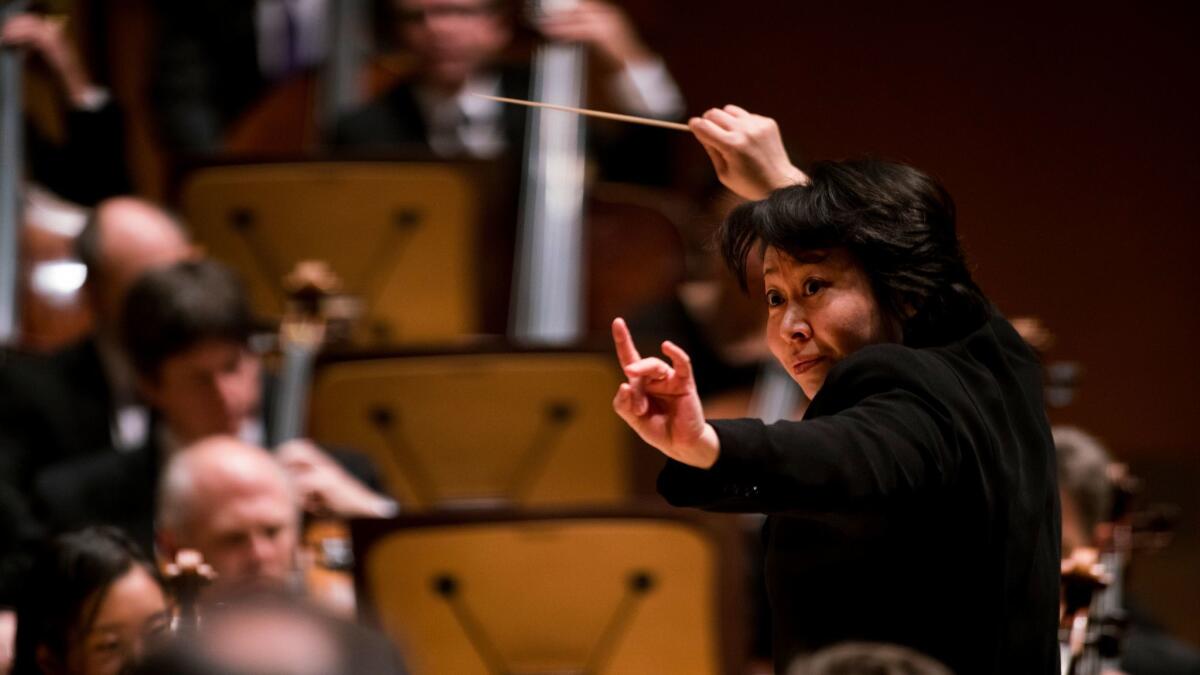Review: An L.A. Phil reminder that but a mile, and fate, separate Disney Hall from skid row

Has any country ever suffered victory as Russia did at the end of the World War II in 1945? Losses were incalculably terrible, and the future was as scary as ever with Stalin still in power. The dictator wanted victory symphonies. Composers found celebration wanting.
The war wasnât over in 1944 when Prokofiev wrote his Fifth Symphony as a hopeful âhymn to a happy man,â an anxious exercise in optimism rising from disaster. The next year Shostakovich parodied Stalin in his Ninth Symphony, which Valery Gergiev conducted with brilliantly snarling intensity when he brought his Mariinsky Orchestra to Walt Disney Concert Hall last month.
Friday morning in Disney, the Chinese conductor Xian Zhang was the Los Angeles Philharmonic guest conductor for an unflinchingly ferocious performance of Prokofievâs Sixth Symphony. By 1947, hope, for the composer, was replaced in this dark work by trauma.
Prokofiev tried to hold on to what he knew, what he loved, what he believed. The symphony has moments of stunning lyricism. It wants to dance so much that parts of it sound like outtakes from his beloved ballet, âRomeo and Juliet.â But Zhang, rightly so but also surprisingly so, would have very little of that.
The L.A. Philâs fourth female conductor for subscription programs in the last two months and the New Jersey Symphonyâs music director starting last season, Zhang is known for her exciting energy. She seems invariably upbeat. She generates bursts of blindingly bright instrumental colors. She comes across on the podium as a rhythm machine. She goes in for, and gets, a big, bold sound from the ensemble.
All of that made the first half of the program likably lively and anything but threatening. Chen Yiâs âGe Xu (Antiphony)â â written in 1994, just after the ĂŠmigrĂŠ Chinese composer had received her doctorate from Columbia University â is a brief, euphorically arresting picture of the Chinese New Year that easily demonstrates why she so quickly made a splash (and hasnât stopped doing so) in the West.
Tchaikovskyâs Piano Concerto No. 1 featured the flashy Venezuelan pianist Sergio Tiempo as soloist. Heâs a lot of fun in the way he dashes off fancy finger work. Every passage offers him something with which to show off. Zhang seemingly tried to rein him in at first, but she ultimately and good-naturedly went along for the ride.
The Prokofiev Sixth was something else. The composer offers his interpreters various forms of avoidance. The symphony can be seen as a somber looking back, its lyricism the wistful recollection of whatâs lost as an impetus to rise and dance again, however crushing that outburst at the scoreâs end.
Zhang, on the other hand, treats the symphony more as a newsreel with the marching armies and the vistas of devastation. She amplifies the threat and underscores the danger. She conducts as if the symphony were made out of oversized instruments. She places the cellos, basses and most of the bass brass instruments on her the right and they come across as weapons. The strings and winds on her left respond just short of a scream. The romantic bits sound physically ripped from âRomeo and Juliet.â
But what most made Zhangâs performance moving Friday, beyond the stupendous performance from the L.A. Phil, was an underlying warmth and spirit. There may be neither irony nor ambiguity in her demonstration of Prokofiev issuing a red flag warning, but she also reveals an indomitable spirit, a vision of what is at risk.
The moment the concert was over, a number of the players immediately took off their concert dress, donned Street Symphony T-shirts and headed to skid row, not much more than a mile away yet where every manner of human hardship overwhelms the sidewalks and emotions, as though downtown itself had been devastated by war. The Midnight Mission hosted its third annual âMessiah Projectâ that afternoon.
This is the inspiration of L.A. Phil violinist Vijay Gupta, who founded the Street Symphony to bring a high level of music and music training to skid row shelters and to prisons. For the âMessiah Project,â the Street Symphony and Chamber Singers (members of the Los Angeles Master Chorale), along with Urban Voices Project (members of the skid row community) come together for selections from Handelâs âMessiah,â with solos sung by professional singers and community members they have coached. Like Zhangâs Prokofiev, there is no sugar coating. The anguish is real and inescapable â but is what makes the joy real, too.
This year there was also an impressive work by a bass player, Benjamin Shirley, whose life fell apart through substance abuse and who spent two years homeless. He is now the Street Symphonyâs first composer fellow, and the program included the premiere of his âWe Need Darkness to See the Stars,â written for the occasion.
âIt is never too late,â a bass, Brian Palmer said, having overcome heroin addiction. He then compellingly sang the âMessiahâ aria âThe People Who Walked in Darkness.â
If, as Gov. Jerry Brown says, fires are the new normal in California, no one in this state is safe from sudden homelessness, about which the state of skid row has much to teach us. And at a time when we have little patience, at least in public life, for the possibility of redemption from past sins, Palmer reminds us that he walked in darkness and survived to sing with authority about the light.
MORE ARTS NEWS AND REVIEWS:
In a season full of âNutcracker,â the brilliance of Balanchine shines through
Michael Luwoye: How a theater outsider became Alexander Hamilton
âThe Bandâs Visitâ turns song, speech and silence into stage poetry
More to Read
The biggest entertainment stories
Get our big stories about Hollywood, film, television, music, arts, culture and more right in your inbox as soon as they publish.
You may occasionally receive promotional content from the Los Angeles Times.











